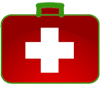Various allergy medications are readily available to manage allergy symptoms. Some are available by prescription while others are over-the-counter. Just like with any medications, the over-the-counter variants must only be used with the advice of the doctor especially if given to children.
Commonly used allergy medications
Antihistamines
Antihistamines work by suppressing the effects of histamine in the bodily tissues. For mild symptoms, these allergy medications are recommended by the doctor. Children who do not like to swallow tablets can be given the chewable or syrup form.
These allergy medications are useful in managing the itchiness of hives, eczema or hay fever. The doctor might advise to use them regularly or only if needed.
Decongestants

Among those with hay fever, antihistamine is often given along with a decongestant, oftentimes combined in one medication. When decongestants are taken orally, it can trigger stimulation. Children who are given these medications might act hyper, feel anxious, has difficulty sleeping or have a racing heartbeat. Due to the side effects, decongestants should not be used long-term daily.
Treatment involving decongestants can be administered topically with nasal drops or sprays, but these must be used carefully and only for a brief period since prolonged use can cause a rebound effect.
Cromolyn
Cromolyn sodium is oftentimes recommended to prevent nasal allergy symptoms. This can be utilized daily for chronic issues or for a brief period if a child is likely to be exposed to allergens.
Corticosteroids
Corticosteroids are highly effective allergy medications that are widely used to control symptoms. They are available in topical forms, pills, nasal sprays, inhalers or liquids.
For children with eczema, the steroid ointments and creams are the preferred choice of treatment. They control eczema if applied once a day depending on the severity of the rash. The nasal sprays are effective for those with nasal allergy symptoms.
